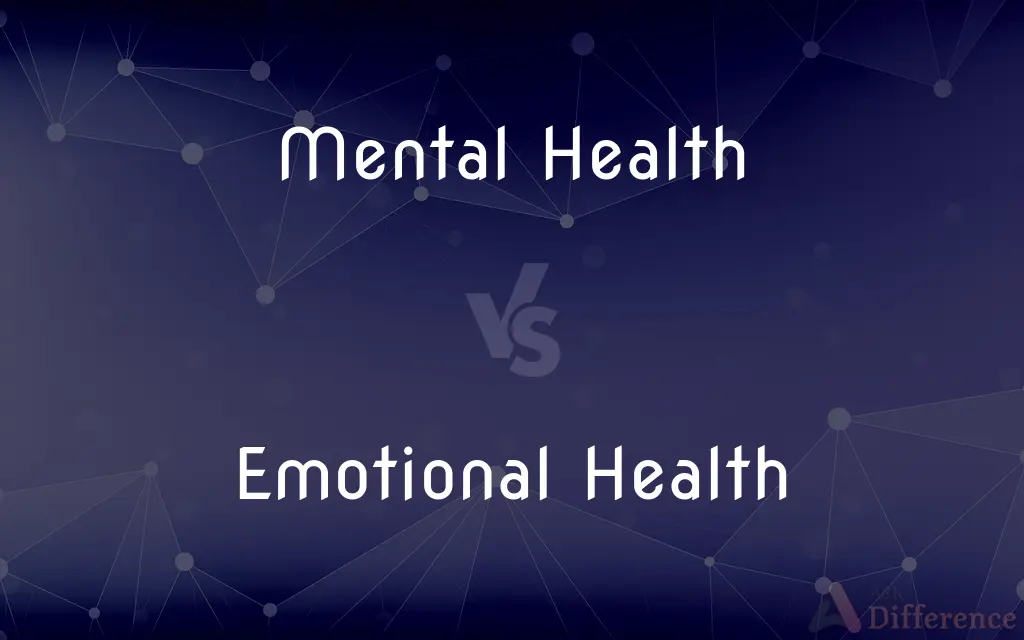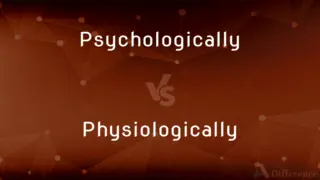Mental Health vs. Emotional Health — What's the Difference?
Edited by Tayyaba Rehman — By Fiza Rafique — Published on December 3, 2023
Mental Health pertains to cognitive processes and psychological well-being; Emotional Health focuses on understanding and managing emotions.

Difference Between Mental Health and Emotional Health
Table of Contents
ADVERTISEMENT
Key Differences
Mental Health relates to the cognitive and psychological state of an individual, encompassing their ability to think, reason, and understand. Emotional Health, on the other hand, delves into a person's capability to recognize, express, and manage their emotions effectively. Both are intertwined, as our thoughts can influence our emotions and vice versa.
Mental Health can affect one's decision-making, problem-solving, and reasoning capabilities. Emotional Health, in contrast, reflects how we handle stress, relate to others, and make choices. A sound emotional state can mitigate mental health issues, just as good mental health can support emotional resilience.
For Mental Health, therapy may address cognitive distortions or unhealthy thought patterns. In treating Emotional Health, therapy might focus on emotional regulation or developing healthier emotional responses. While both areas can benefit from professional intervention, their focal points differ.
Challenges in Mental Health might manifest as difficulties in concentration, memory issues, or impaired judgment. Whereas challenges in Emotional Health often present as intense mood swings, persistent feelings of sadness, or being overwhelmed by emotions. Both areas require attention and care for overall well-being.
Lastly, Mental Health plays a role in one's self-perception, relationships, and how one interacts with the world. Emotional Health dictates one's emotional responses to situations, their capacity for empathy, and their ability to cope with life's ups and downs. Both are fundamental to living a balanced life.
ADVERTISEMENT
Comparison Chart
Focus Area
Cognitive processes & psychological state
Recognition, expression & management of emotions
Therapeutic Approach
Addresses cognitive distortions
Focuses on emotional regulation
Manifestation of Issues
Concentration, memory, impaired judgment
Mood swings, overwhelming emotions
Role in Life
Influences interactions & self-perception
Dictates emotional responses & coping ability
Interplay with the Other
Can be influenced by emotional well-being
Often influenced by one's mental state
Compare with Definitions
Mental Health
A measure of one's ability to think, reason, and understand.
Challenges in mental health can affect daily functioning.
Emotional Health
The capacity to understand, manage, and express one's emotions effectively.
Meditation improved his emotional health significantly.
Mental Health
The state of one's psychological and cognitive well-being.
Her mental health improved after seeking therapy.
Emotional Health
The quality of one's emotional responses and interactions.
Emotional health can be gauged by one's ability to empathize and connect with others.
Mental Health
Pertains to the absence or presence of mental disorders.
Raising awareness about mental health is essential in today's world.
Emotional Health
A reflection of one's emotional intelligence and regulation.
Her emotional health allows her to handle stress with grace.
Mental Health
Reflects one's emotional, psychological, and social well-being.
Mental health plays a significant role in how we perceive and react to the world.
Emotional Health
A facet of well-being that focuses on emotional balance and harmony.
Prioritizing emotional health leads to better relationships and overall happiness.
Mental Health
The overall condition of an individual's psychological processes.
Many factors, both internal and external, can influence one's mental health.
Emotional Health
Indicates how well an individual copes with emotional challenges.
Good emotional health often results in more balanced reactions to stressful events.
Common Curiosities
What is the primary focus of Mental Health?
Mental Health focuses on cognitive processes, psychological well-being, and the absence or presence of mental disorders.
Can Mental Health affect Emotional Health?
Yes, Mental Health and Emotional Health are intertwined; challenges in one can influence the other.
How does Emotional Health differ from Mental Health?
While Mental Health pertains to cognitive and psychological states, Emotional Health emphasizes the understanding and management of emotions.
Are there therapies that address both Mental and Emotional Health?
Yes, many therapeutic approaches address both Mental Health and Emotional Health aspects of an individual.
How does Emotional Health influence relationships?
Emotional Health impacts how one emotionally responds, empathizes, and connects with others.
Can medications help both Mental and Emotional Health?
Yes, certain medications can assist in managing Mental Health disorders and can indirectly benefit Emotional Health.
Can one have good Mental Health but poor Emotional Health?
It's possible; one might have strong cognitive abilities (Mental Health) but struggle with emotional regulation (Emotional Health).
Are there specific disorders linked to Mental Health?
Yes, disorders like depression, anxiety, and schizophrenia are directly related to Mental Health.
Is it essential to address both Mental and Emotional Health for overall well-being?
Absolutely, both Mental Health and Emotional Health are crucial for a balanced, healthy life.
What might be a sign of poor Emotional Health?
Intense mood swings, persistent sadness, or being overwhelmed by emotions can indicate compromised Emotional Health.
Can physical health impact Mental and Emotional Health?
Yes, physical health can influence both Mental Health and Emotional Health; they are interconnected.
How can one improve their Emotional Health?
Practices like mindfulness, therapy, and emotional intelligence training can enhance Emotional Health.
Are children and adolescents vulnerable to Mental and Emotional Health issues?
Yes, both Mental Health and Emotional Health issues can arise at any age, including during childhood and adolescence.
How do life experiences affect Mental and Emotional Health?
Traumatic or significant life events can have profound impacts on both Mental Health and Emotional Health.
Is there a stigma associated with Mental and Emotional Health challenges?
Unfortunately, there can be societal stigmas around Mental Health and Emotional Health, but awareness and education are helping reduce these misconceptions.
Share Your Discovery

Previous Comparison
Hire Purchasing vs. Leasing
Next Comparison
Android 5.1.1 Lollipop vs. 6.0.1 MarshmallowAuthor Spotlight
Written by
Fiza RafiqueFiza Rafique is a skilled content writer at AskDifference.com, where she meticulously refines and enhances written pieces. Drawing from her vast editorial expertise, Fiza ensures clarity, accuracy, and precision in every article. Passionate about language, she continually seeks to elevate the quality of content for readers worldwide.
Edited by
Tayyaba RehmanTayyaba Rehman is a distinguished writer, currently serving as a primary contributor to askdifference.com. As a researcher in semantics and etymology, Tayyaba's passion for the complexity of languages and their distinctions has found a perfect home on the platform. Tayyaba delves into the intricacies of language, distinguishing between commonly confused words and phrases, thereby providing clarity for readers worldwide.















































